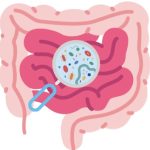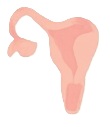Probiotics and the Microbiome
Let’s Talk Gut Health – probiotics are gaining popularity for their role in supporting hormonal balance and enhancing our overall well-being.
Research suggests that probiotics can help improve digestion, reduce inflammation, and even support weight management, which are all factors that contribute to hormonal balance. The reduction of oestrogen during perimenopause can disrupt your gut health, leading to:
- Bloating
- Constipation
- IBS-like symptoms
- Weight changes
- Vaginal dryness or infections
- Low mood or anxiety
By helping to maintain a healthy gut microbiome, probiotics can truly make a difference!
 So, what exactly are probiotics? They are live microorganisms—mostly bacteria—that are thought to provide some great health benefits when taken in the right amounts. Probiotics can be found in various forms, including fermented foods like yogurt, kimchi, and sauerkraut, as well as in supplement form. Although research on probiotics for easing perimenopause symptoms is still developing, there’s some promising evidence that they could be helpful.
So, what exactly are probiotics? They are live microorganisms—mostly bacteria—that are thought to provide some great health benefits when taken in the right amounts. Probiotics can be found in various forms, including fermented foods like yogurt, kimchi, and sauerkraut, as well as in supplement form. Although research on probiotics for easing perimenopause symptoms is still developing, there’s some promising evidence that they could be helpful.
The microbiome is the collection of trillions of tiny organisms—mostly bacteria, but also fungi, viruses, and other microbes—that live in and on your body. Think of it as a bustling, invisible ecosystem that helps keep you healthy.
There are several different areas which have their own microbiome – the gut, vagina, mouth, skin and the urinary tract. Ensuring these are as healthy as they can be goes a long way to reduce the effects of perimenopause.

Vaginal Health: Probiotics can help maintain a healthy balance of bacteria in the vaginal microbiome, potentially lowering the risk of infections and easing discomfort like dryness, which many women experience during perimenopause. Avoid harsh soaps or scented products, wear breathable underwear and use vaginal moisturisers.
 Mood and Mental Health: Exciting new research points to a link between gut health and brain health, often called the gut-brain axis.
Mood and Mental Health: Exciting new research points to a link between gut health and brain health, often called the gut-brain axis.
This connection highlights the importance of maintaining a healthy gut to support emotional well-being during hormonal transitions.
Probiotics might boost mood and mental wellness by influencing gut bacteria that produce neurotransmitters like serotonin.
Digestive Health: Keeping our digestive system happy is another area where probiotics shine.
By promoting healthy digestion and nutrient absorption, probiotics may also alleviate some gastrointestinal symptoms related to hormonal changes.
They can help create a balanced gut microbiome, which is especially beneficial since some women experience digestive issues like bloating and irregular bowel movements during perimenopause.
Immune Function: A robust gut microbiome is crucial for a strong immune system, especially because hormonal changes during perimenopause can affect immunity.
Choose the Right Strains: Probiotics come in different strains, each possibly offering different benefits.
Research indicates that strains such as Lactobacillus and Bifidobacterium are particularly beneficial for women’s health.
Seek out those that support vaginal and gut health specifically.
Maintain a Healthy Lifestyle: Think of probiotics as a helpful addition to a healthy lifestyle that features a balanced diet, regular exercise, and stress management, all of which can positively influence perimenopause symptoms.
Be Patient: Remember, probiotics may take a little time to show effects, and their effectiveness can vary by individual.
Tracking your symptoms can be useful, as it may help you notice changes over time and determine how probiotics are working for you.
So, be patient and consistent with their use!
You can improve your microbiome with probiotics but also by eating more fibre -rich foods – oats, berries, apples, carrots, salad, rice and beans. Although not to every bodies taste, fermented foods can also be a big help – sauerkraut, kefir and live yogourt. Eating less processed food helps by reducing inflammation and varying your food by having a diverse diet..
As always, maintaining open communication with your healthcare provider can help ensure that your approach to managing perimenopause symptoms remains effective.
